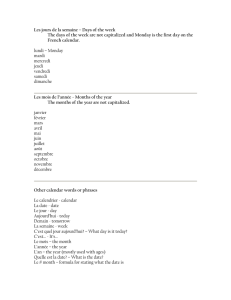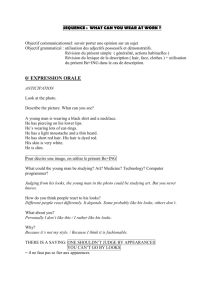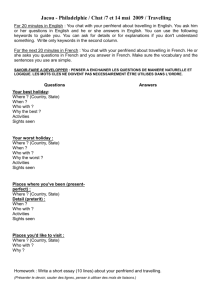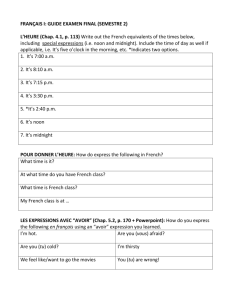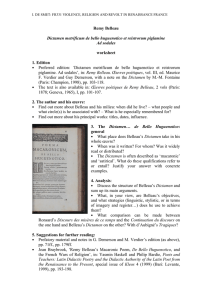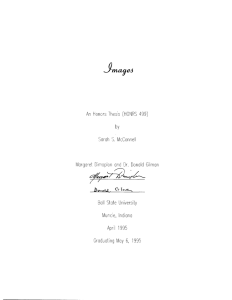Leçon: “Mama, l'enfant sénégalais”
advertisement
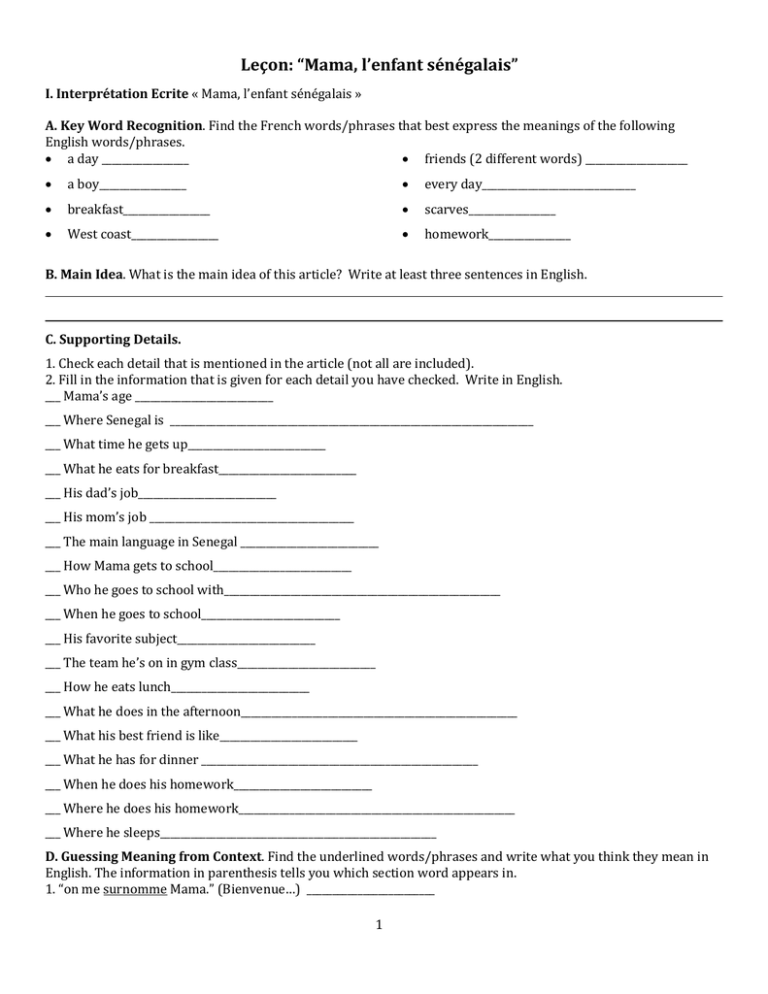
Leçon: “Mama, l’enfant sénégalais” I. Interprétation Ecrite « Mama, l’enfant sénégalais » A. Key Word Recognition. Find the French words/phrases that best express the meanings of the following English words/phrases. a day _________________ friends (2 different words) ____________________ a boy_________________ every day______________________________ breakfast_________________ scarves_________________ West coast_________________ homework________________ B. Main Idea. What is the main idea of this article? Write at least three sentences in English. C. Supporting Details. 1. Check each detail that is mentioned in the article (not all are included). 2. Fill in the information that is given for each detail you have checked. Write in English. ___ Mama’s age ___________________________ ___ Where Senegal is _______________________________________________________________________ ___ What time he gets up___________________________ ___ What he eats for breakfast___________________________ ___ His dad’s job___________________________ ___ His mom’s job ________________________________________ ___ The main language in Senegal ___________________________ ___ How Mama gets to school___________________________ ___ Who he goes to school with______________________________________________________ ___ When he goes to school___________________________ ___ His favorite subject___________________________ ___ The team he’s on in gym class___________________________ ___ How he eats lunch___________________________ ___ What he does in the afternoon______________________________________________________ ___ What his best friend is like___________________________ ___ What he has for dinner ______________________________________________________ ___ When he does his homework___________________________ ___ Where he does his homework______________________________________________________ ___ Where he sleeps______________________________________________________ D. Guessing Meaning from Context. Find the underlined words/phrases and write what you think they mean in English. The information in parenthesis tells you which section word appears in. 1. “on me surnomme Mama.” (Bienvenue…) _________________________ 1 2. “J’ai aussi des cours particuliers” (En route…) __________________________ 3. Et pour distinguer les équipes » (Une classe…)_____________________ 4. « On invite souvent les voisins ou les amis » (Un déjeuner…)________________________ 5. « On mange avec la main droite. » (Un déjeuner…)________________________ E. Cultural Comparison. Answer the following question in English. 1. Name at least 7 differences between Mama’s typical day and yours. Then explain why each difference exists— What cultural practices or perspectives are reflected in each difference. Differences Cultural Practice/Perspective which contributes to the difference 2 II. Communication Interpersonnelle Discuss Mama’s typical day in French with your partner and fill in the diagram comparing Mama’s day to his/hers. You do not need to write in complete sentences. Here are some question starters you can use: Où est-ce que tu….? Where do you… ? Quand est-ce que tu…? When do you … ? Qu’est-ce que tu … ? What do you … ? Quelle langue/Quelle matière/ est-ce que tu… ? What language/subject do you ….? Comment est-ce que tu … ? How do you … ? Mama Mon/Ma Partenaire: ____________ Son âge Où il/elle habite Quand il/elle se lève Ce qu’il mange comme petit déjeuner La langue qu’il/elle parle à la maison Comment il/elle va à l’école Quand il va à l’école Sa matière préférée Ce qu’il/elle fait l’après-midi Une description de son meilleur ami (sa meilleure amie) Ce qu’il/elle prend comme diner Quand il/elle fait ses devoirs Où il/elle fait ses devoirs Où il/elle dort 3 III. Présentation Ecrite Imagine that you are writing an article about a typical day of an American student (your partner). Your article should have at least 125 words. 4
